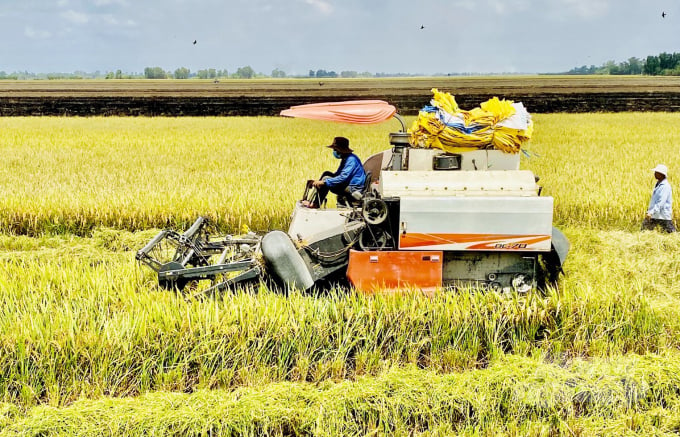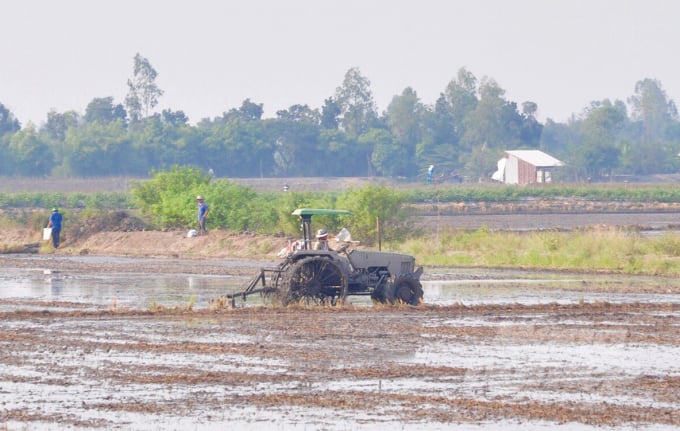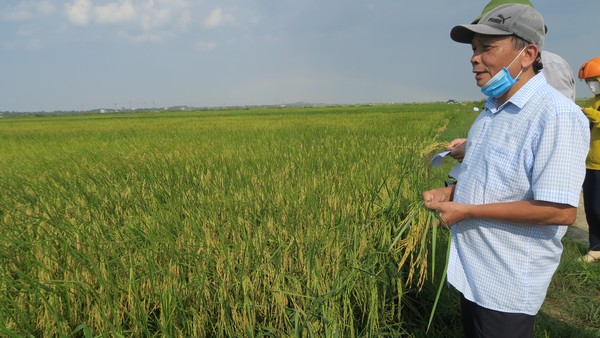May 21, 2025 | 04:10 GMT +7
May 21, 2025 | 04:10 GMT +7
Hotline: 0913.378.918
May 21, 2025 | 04:10 GMT +7
Hotline: 0913.378.918
Due to the fragrant and delectable nature of rice, the province of Soc Trang is home to numerous well-known specialty rice varieties. Soc Trang's specialty rice includes the ST rice varieties (ST24 and ST25), the Tai Nguyen rice variety, and other fragrant soft rice varieties.
After agricultural technical officials investigated and established a supply of pure rice varieties with quality assurance and preservation of their purity, the specialized fragrant rice planting area has expanded within and beyond the province of Soc Trang.

Mechanization of harvesting has helped improve the quality of Soc Trang's specialty fragrant rice over the years. Photo: Huu Duc.
In recent years, specialty fragrant rice farmers in Soc Trang have actively increased production value and profits by adopting technical advancements provided by the Program on promoting specialty rice production in Soc Trang and other agricultural projects, thereby reducing production costs by 15 to 20 percent. The quality of rice and rice plants within and outside of the project area has been appreciated by domestic and foreign markets and is sold at a price of VND 700-1,500 per kilogram above that of conventionally farmed rice. Particularly, farmers are shifting from fragmented to concentrated production in accordance with the collective model.
Currently, there are 371 cooperation groups and 54 agricultural cooperatives in Soc Trang that sign linking consumption contracts for rice farmed on over 53,170 hectares in accordance with biosafety, organic, and VietGAP standards. The organic specialty rice farming model is replicated on 2,400 hectares.
However, there are some farmers in the specialized fragrant rice cultivation who are sluggish to adopt an organic and VietGAP production mindset.
To expand the specialty rice cultivation area from 2022 to 2025, the province of Soc Trang continues to consolidate and establish cooperation groups and cooperatives of rice production; to adopt technological advances into production on large paddies, and to establish production links aimed toward safety. The province will encourage super primary and primitive varieties, as well as establish a certified breeding system.
Mr. Ho Quang Cua- the leader of a group of authors who researched and created the ST rice varieties noted that during the cultivation of ST fragrant rice varieties, farmers must plough the ground lose and work the soil carefully before sowing to avoid the ineffective production and low-output crop.

Paying attention to the stage of ploughing the ground lose will help increase rice yield and improve rice quality. Photo: Huu Duc.
The period of soil preparation is essential for loosening the soil, eliminating weeds, and preparing the proper environment for the rice plant's early growth phase.
ST25 rice can be harvested approximately 95-100 days after sowing. Using a harvester is quick, reduces loss to increases productivity, and delivers the rice quickly to facilities for drying and milling to preserve the highest quality.
In addition, if planting does not adhere to the specified cropping schedule, irrigation water will be difficult to obtain when an early salt intrusion occurs.
The source of irrigation water must be assured. To cultivate the ST25 variety as effectively as possible, farmers are urged by agricultural experts to adopt a smart rice cultivation process that reduces the amount of seed sowing, the amount of fertilizer, the pesticide, and the water used for irrigation, saves a great deal of money, and produces high yields.
In addition, farmers must implement a smart fertilizer process by selecting a balanced fertilizer with multi, medium, and trace elements, and applying fertilizer at the optimal period for rice plants.
Bring the cultivation of specialty rice into the depths
From 2022 to 2025, the Program on developing specialty rice production in Soc Trang aims to expand a broad raw material area in order to establish a brand for Soc Trang specialty rice. It is expected to reach 195,000 hectares in 2025, accounting for sixty percent of the province's sowing area; the output of specialty rice and high-quality rice will reach eighty percent of the province's total output, and ST variety production will be given priority.
In addition to establishing 21 specialty rice raw material areas and 12 specialty rice cultivation models that are adaptable to climate change, the program focuses on the consolidation of cooperatives, the promotion of the quality of local specialty rice production and supply networks, and the technical transfer to farmers.

In the period of 2022 - 2025, Soc Trang's specialty rice production will continue to deepen, especially in the production organization. Photo: TL.
Accordingly, in each raw material area, the project will construct training areas for farmers, implement technological advances, and implement biological measures to protect plants, such as "1 must 5 reduce," integrated pest management IPM, the use of biological and organic products, and the application of 4.0 technology in production to create safe products that meet market demands.
The program will be flexible and in tune with market needs. The program's management board is intended to engage firms in specialty rice production to collaborate and consult with cooperatives in order to create and establish production standards for each model in accordance with the requirements and demands of the enterprises.
From there, the project will offer solutions to support science, technology, and agricultural extension; support and encourage rice seed production establishments, enterprises, and business establishments to invest in and apply scientific and technical advances, apply high technology and support smart and appropriate rice farming models that are adaptable to climate change.
The Project of promoting specialty rice production in the province of Soc Trang has been implemented in two phases (2012-2015 and 2016-2020), contributing to the expansion of specialty rice and fragrant rice land. In 2012, the area was expanded from 66,000 hectares to more than 178,000 hectares by 2020, 40,500 hectares more than planned; rice output grew by more than one million tons, 35.5% more than planned.
Translated by Linh Linh

(VAN) Japan's grant aid project contributes to capacity building, promoting organic agricultural production, and fostering sustainable community development in Dong Thap province.

(VAN) For years, the CRISPR-Cas9 genome technology has been reshaping genetic engineering, a precision tool to transform everything from agriculture to medicine.

(VAN) Vietnam aims to become a 'leader' in the region in the capacity and managing effectively soil health and crop nutrition.
![Reducing emissions from rice fields: [Part 1] Farming clean rice together](https://t.ex-cdn.com/nongnghiepmoitruong.vn/608w/files/news/2025/05/05/z6509661417740_a647202949c539012a959e841c03e1d3-nongnghiep-143611.jpg)
(VAN) Growing clean rice helps reduce environmental pollution while increasing income, allowing farmers to feel secure in production and remain committed to their fields for the long term.
/2025/05/19/5136-1-144800_230.jpg)
(VAN) The Nghe An Provincial People's Committee has just approved the list of beneficiaries eligible for revenue from the Emission Reductions Payment Agreement (ERPA) in the North Central region for the year 2025.

(VAN) 14 out of 35 domesticated elephants in Dak Lak province have had their living conditions improved, with 11 of them currently participating in the non-riding elephant tourism model.

(VAN) Muong Nhe Nature Reserve hopes that being upgraded to a national park will lay the foundation for forest protection efforts to be carried out in a systematic, modern, and sustainable manner.